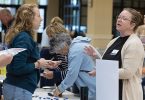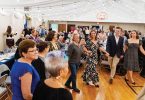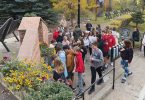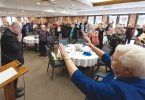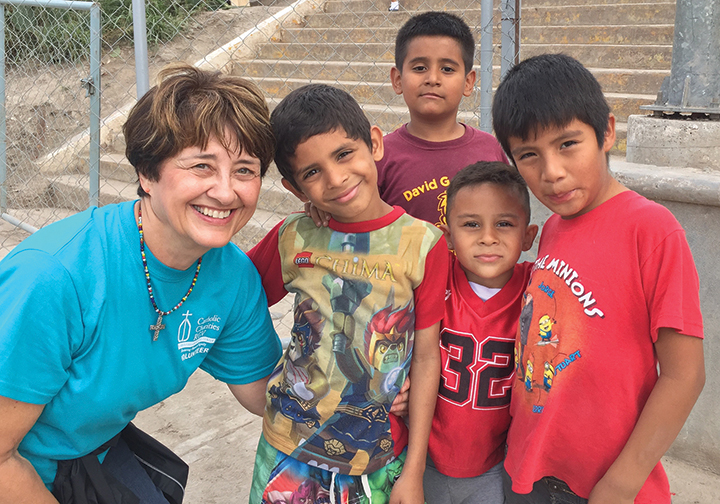
by Therese Horvat
Special to The Leaven
As oblates of the Benedictine Sisters of Mount St. Scholastica in Atchison, Terry Diehl and Dennie Oades have felt under the influence of God’s grace in special ways over the past several months. Taking to heart the teachings of Jesus, the Rule and spirituality of St. Benedict, and the words of Pope Francis, they have volunteered twice to serve migrants and asylum seekers at the U.S./Mexico border.
Outreach to the world
Oblates are Christian women and men from varied walks of life. Generally, they are laypeople who seek to live in harmony with the spirit of St. Benedict in contemporary times. Sister Therese Elias, OSB, is one of four oblate directors in the Kansas City area for the Atchison Benedictine Sisters. She describes the oblate community as very ecumenical.
For example, Diehl and Oades have each served as pastors in two different Protestant denominations. Diehl belongs to Hickman Mills Community Christian Church in Kansas City, Missouri, where she pastored for 39 years. She lives in Stilwell. Oades lives in Kansas City, Missouri, and attends the United Methodist Church of the Resurrection in Leawood. She has been a pastor, a medical social worker and a medical psychologist.
“Oblates are our outreach to the world,” explained Sister Therese. “They are in the world more than we are and have more opportunities to practice Benedictine values. They make a promise — not a vow — to live the Rule of St. Benedict.”
That Rule and the saint’s spirituality espouse characteristic values and virtues including hospitality, meeting Christ in each guest, humility, self-knowledge, and respect for others, especially for those who are poor and who are pilgrims. The Rule is central to monthly small group meetings of oblates. They strive to live the Rule in their prayer and work.
Called to ‘welcome the stranger’
Three years ago when the Benedictine Sisters received the call to serve at the border, leadership extended the opportunity to the oblates. To date, eight Sisters and 12 oblates have volunteered. In January 2020, Diehl and Oades traveled to McAllen, Texas; more recently, they served in San Diego. Both times, they volunteered through Catholic Charities organizations.
In McAllen, they spent mornings making sandwiches and packing snacks and supplies with other volunteers and staff. They transported these items to Brownsville, Texas, then across the border for distribution to migrants detained in the “tent city” in Matamoros, Mexico.
Time permitting, Diehl and Oades walked through the camp and engaged with the people, largely from Central America. Calling it a tent city was a stretch. Oades says the migrants used whatever they could — cardboard, aluminum foil, tarps — to shape a shelter.

Diehl credits their creativity. They used a washing tub to cook in; soaked their clothes in the river and dried them on trees or fences. They requested discarded milk containers to water flowers they were growing.
“They tried to create beauty in situations we can’t imagine,” Diehl noted.
This summer in San Diego — again working with Catholic Charities staff — the two volunteers performed various tasks at the shelter that welcomed migrants who had crossed the border with few belongings. Diehl and Oades assembled snack bags and helped families access hygiene products and clothing. They guided asylum-seekers to their temporary rooms where they stay for only 24 to 48 hours before leaving to unite with family members or sponsors across the United States.
With 100 persons arriving daily and limited space, rapid turnaround is critical. Three times daily, buses leave the shelter for the airport.
Diehl and Oades spent the majority of their time accompanying families to and through the airport to acquire boarding passes, go through security, locate departure gates and navigate resources in the terminal. Most of these asylum seekers came through Mexico from Brazil, Venezuela, Central America and Romania. Many were going to jobs lined up by their families in the United States, who also paid their travel expenses. Diehl emphasizes that the asylum-seekers are not freeloaders; they are men, women and entire families seeking new lives.
Living on hope
The volunteers experienced people who were kind and sharing, who were making the best of what they had and who lived on hope. In Matamoros, a migrant sitting under a tarp with children offered Diehl an orange. When another family received a tent for shelter, a young member was eager to show the volunteers their new “home.”
In San Diego, Oades escorted a migrant who didn’t have a phone chip; the man Diehl was accompanying purchased a chip for this individual. When an elderly man fell on an airport escalator, an asylum- seeker immediately came to his aid.
Diehl and Oades likewise acknowledged the dedicated Catholic Charities staff and other volunteers.
“We had a very small part in a very big process,” said Oades. “We were supporters of the process Catholic Charities has in place to be a face, hands and feet to assist the asylum-seekers.”
“Oades and Diehl are remarkable women, but what they’re doing is simple, really. They’re following the Gospel and the way of Benedict,” said Sister Therese. “In this, they’re not unique among our oblates, whom I see responding to the call to meet Christ in the ‘other’ wherever they are. This is an invitation that ought never be far from the mind of any Benedictine.”
Or of any Christian.
Oades suggests three ways to be active in welcoming the stranger: First, become better educated about immigration, migrants and asylum-seekers, and the challenges they encounter; next, seize opportunities to serve; finally, advocate with policy makers for systemic changes affecting immigration.
While it may seem strange advice coming from a Protestant pastor, Diehl also encourages people of all denominations to become familiar with “Fratelli tutti,” Pope Francis’ encyclical. She has experienced and believes, “When we welcome the stranger, the stranger has a blessing for us.”

